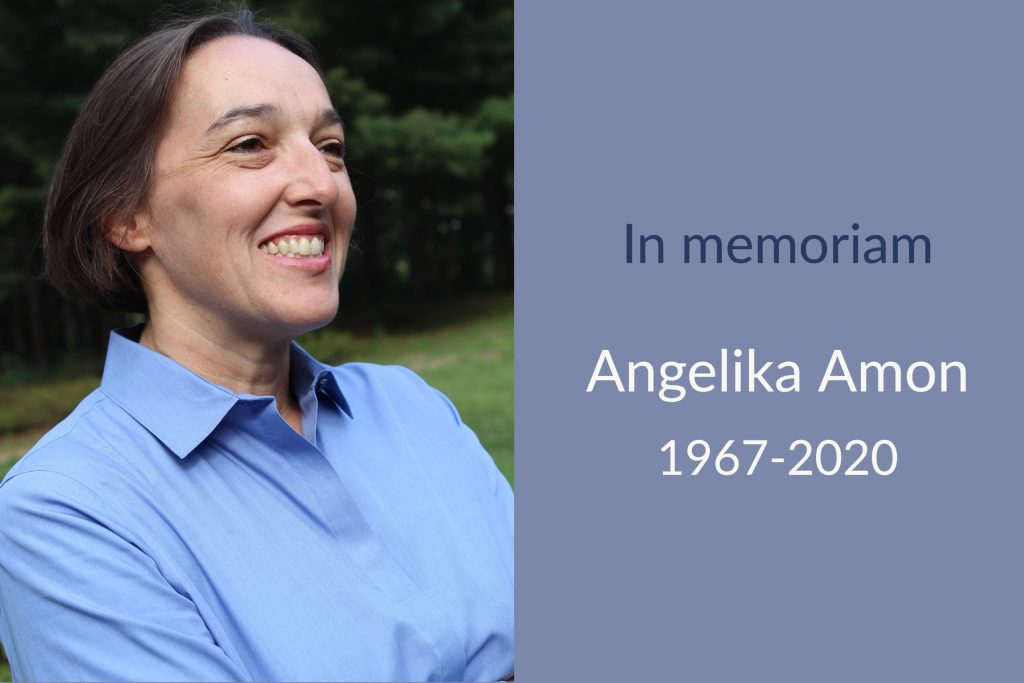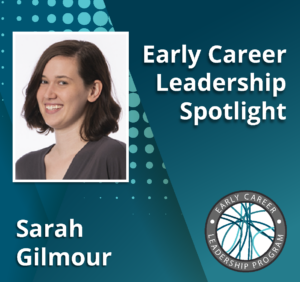
Photo taken by Angelika’s daughter, Theresa Weis
When you’ve been in science long enough, you become part of a certain generation: people with whom you were roommates at Gordon conferences as postdocs, discussed your latest data and shiny ideas during session breaks as a young faculty, and looked forward to seeing at meetings as established scientists. Angelika was part of my generation; we met as postdocs and remained friends long after our scientific interests diverged. Over the years we talked a lot about science but also about kids and dogs and gardening. One doesn’t expect to write a tribute for someone from their own generation—at least not just yet.
Angelika was born in 1967 in Vienna, Austria. She did her PhD with Kim Nasmyth at the Research Institute of Molecular Pathology, also in Vienna, studying the regulation of the cell cycle in budding yeast. She then came to the US to do her postdoc at MIT. After a brief period with Ruth Lehman, who moved to New York, Angelika became a Whitehead Fellow, returning to the study of cell cycle regulation and, in particular, the spatial and temporal regulation of events associated with mitotic exit. Angelika’s lab was one of the first to demonstrate that the nucleolus can serve as a reservoir for regulatory proteins that act elsewhere. Angelika then joined the Biology Department at MIT, where she ultimately became the Kathleen and Curtis Marble Professor in Cancer Research at the Koch Institute for Integrative Cancer Research at MIT and a Howard Hughes investigator. She expanded her work from yeast to mammalian systems, exploring the consequences of aneuploidy, which is when a cell has a wrong complement of chromosomes, a condition often associated with cancer. Angelika’s lab showed that different types of aneuploidy are associated with a common signature of cell stress and altered metabolism. Her lab further showed that this, in turn, alters cell properties in ways that both promote tumor progression and may increase resistance to chemotherapy. Beyond her studies on aneuploidy, Angelika was a true believer in curiosity-driven basic research, which she practiced to tremendous success in studies on cell size and density, mitochondrial surveillance pathways, the role of long non-coding RNA in yeast sporulation, the role of meiosis in cell rejuvenation, and more.
Angelika’s groundbreaking discoveries led to many awards, too numerous to list here. They include the Breakthrough Prize in Life Sciences, which “honors transformative advances toward understanding living systems and extending human life”1 and the Vilcek Prize in Biomedical Science, given to “immigrants who have made lasting contributions to American society.”2 Angelika also won the Genetics Society of America Medal, which “honors an individual member of the Society for outstanding contributions to the field of genetics.”3 She was elected to the National Academy of Science and the American Academy of Arts and Sciences. Her devotion to science extended well beyond research, and she served on many boards and committees, including the Genetic Society of America’s Board of Directors. She was a fierce supporter of increasing the representation of women in science and an advocate for work/life balance. She did work relentlessly, and she always had her laptop with her—while watching TV, cooking dinner, or attending her daughters’ soccer games. She never stopped thinking about science. But at the same time Angelika would regularly leave work early to spend time with her two daughters, Theresa and Clara, and to allow her husband to pursue his career. She had a beautiful herb and vegetable garden that she tended to herself, and she loved orchids and cooking Austrian dishes. She married her high school sweetheart, Johannes, and they remained devoted to each other ever since. Whatever balance she found must have worked because her daughters are truly remarkable.
Angelika was many things to many different people. She was a brilliant scientist, a trail blazer. She was rigorous in her science and demanded the same from others. She was critical but constructive, and her presence at meetings elevated the level of discussion. In her own work, Angelika would seize on an observation, imagine its underlying mechanism, set out to investigate it, and, more often than not, figure it out, which brought her a tremendous amount of joy. I often wondered what made her such a successful scientist; she was definitely bright, but most scientists are bright. What set Angelika apart, I think, was her instinct, which rarely failed her; her conviction, which prompted her to fearlessly pursue a biological question, regardless of the unknown; and her unrelenting belief in her people. It helped, of course, that she attracted brilliant students and postdocs. Still, Angelika’s boundless and infectious enthusiasm inspired people to believe in themselves. Angelika was a dedicated mentor and avid cheerleader to her trainees. She wrote the most amazing letters of recommendation for the people in her lab, and they, in turn, did not disappoint. Angelika made a lasting mark on science not only through her scientific discoveries but also through the scores of talented and well-trained scientists, many of whom are women, who came from her lab.
And, of course, Angelika was immensely entertaining. She was funny without even trying to be so. We were amazed by her boldness, her willingness to share funny personal anecdotes with near strangers. She could be both naïve and extremely savvy. Knowing Angelika was knowing where all the diet coke vending machines were at every meeting venue you ever attended together. It was knowing that when she said, “May I say something?” it was really a rhetorical question. We admired her openness, her seize-the-day approach to life, her joy and sense of wonderment when learning something new, science-related, or otherwise. Angelika was larger than life; she was a force. You would hear her laugh from across the room. Angelika spoke her mind and made us better for it. But the thing that made Angelika so lovable was that even with all her accomplishments, awards, and famousness, she always treated people as her equal—grateful for their advice, time, and friendship. She had many friends, and she loved them all fiercely.
Angelika passed away in October 2020 at the age of 53 after a two-year battle with cancer. She will be sorely missed.
Written by Orna Cohen-Fix
NIH, NIDDK
1https://breakthroughprize.org/
2https://vilcek.org/prizes/vilcek-prizes/
3https://genetics-gsa.org/awards/genetics-society-of-america-medal/













